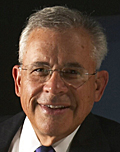[An edited version of this lecture is available in the IHJ Bulletin, Vol.31, No.2, 2011.]
- Speaker: Ronald A. Morse, CEO, Annapolis International
- Moderator: Uesugi Tomiyuki, Professor, Seijo University;
- Director, Center for Glocal Studies, Institute of Folklore Studies
- Date: Wednesday, July 20, 2011, 7:00 – 8:30 pm
- Venue: Iwasaki Koyata Memorial Hall, International House of Japan
- Admission: Free
- Language: English (no Japanese translation provided)
In 1910, Yanagita Kunio (1875-1962) published The Legends of Tono, the first of over 100 books that serve as the foundation of his folklore studies of Japan. Yanagita, while seeking to identify and preserve the culture and religious traditions of village life as found in Tono, Iwate Prefecture, was also a realist about the impact of modernization on Japan. He saw how modernity transformed a nation into an urban, centralized form of government that changed education, social relations, religion, and much else.
When the Kanto earthquake struck Tokyo in 1923, Yanagita, then in London serving with the League of Nations, rushed home and was shocked at the devastation. The same was true during World War II when he wrote his major study on Japanese ancestor worship. If Yanagita were alive today, he would have pointed to the historical lessons of coastal tsunami warnings that were ignored. Having translated The Legends of Tono into English in 1975 and watched the transformation of Tono over the last 40 years, Dr. Morse will explore the lessons of Yanagita’s studies for the cultural, environmental and social issues of Japan today.
Ronald A. Morse
 Ronald A. Morse: Received his Ph.D. in history from Princeton. His publications include Yanagita Kunio and the Folklore Movement: The Search for Japan’s National Character and Distinctiveness (New York: Garland, 1990). He is currently editing a book about Yanagita Kunio studies around the world. He has served at a variety of academic and research institutions, ranging from the Library of Congress, Economic Strategy Institute, University of Maryland, Reitaku University, the Woodrow Wilson International Center in Washington, to the University of California, Los Angeles (UCLA). He was also a well-known commentator on US-Asian affairs during the height of US-Japan economic tensions in the 1980s and 1990s. For over a decade, he published the “Morse Target—a Guide to Washington’s Movers and Shakers on Japan.”
Ronald A. Morse: Received his Ph.D. in history from Princeton. His publications include Yanagita Kunio and the Folklore Movement: The Search for Japan’s National Character and Distinctiveness (New York: Garland, 1990). He is currently editing a book about Yanagita Kunio studies around the world. He has served at a variety of academic and research institutions, ranging from the Library of Congress, Economic Strategy Institute, University of Maryland, Reitaku University, the Woodrow Wilson International Center in Washington, to the University of California, Los Angeles (UCLA). He was also a well-known commentator on US-Asian affairs during the height of US-Japan economic tensions in the 1980s and 1990s. For over a decade, he published the “Morse Target—a Guide to Washington’s Movers and Shakers on Japan.”